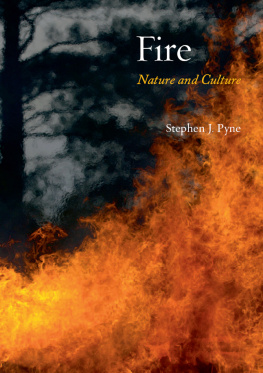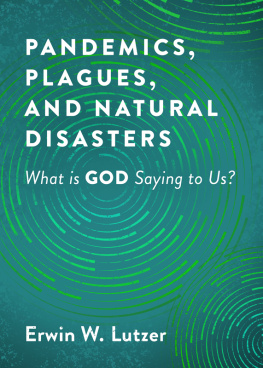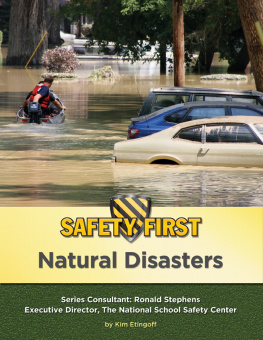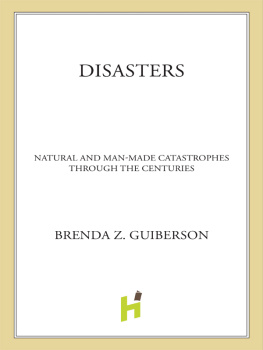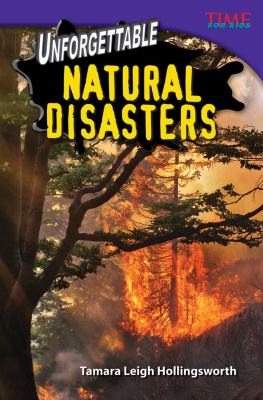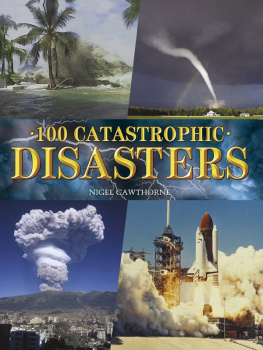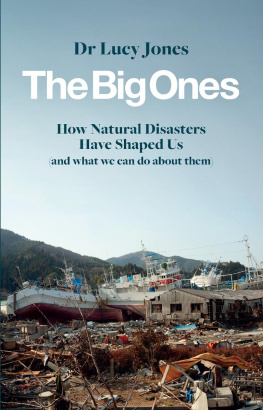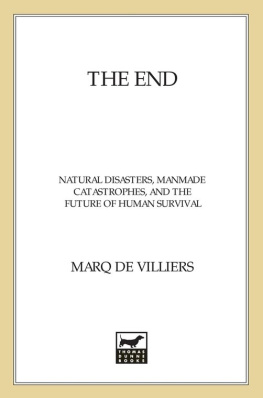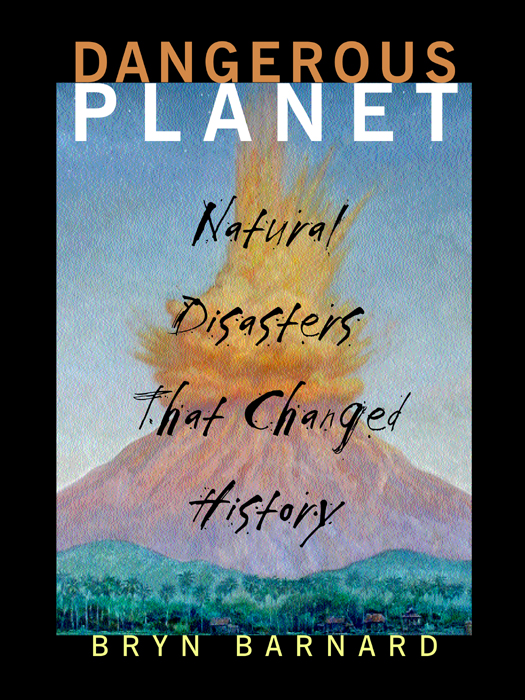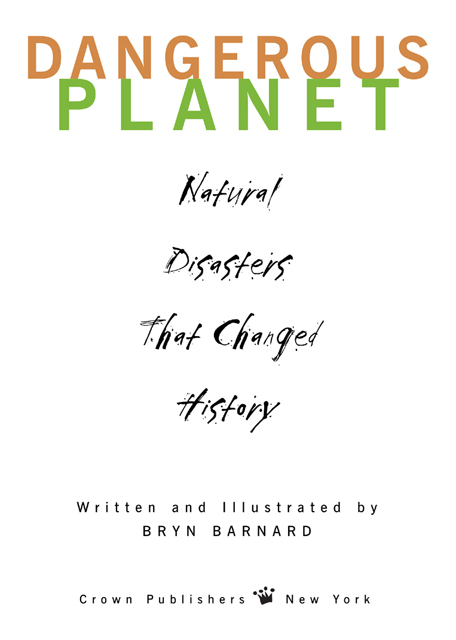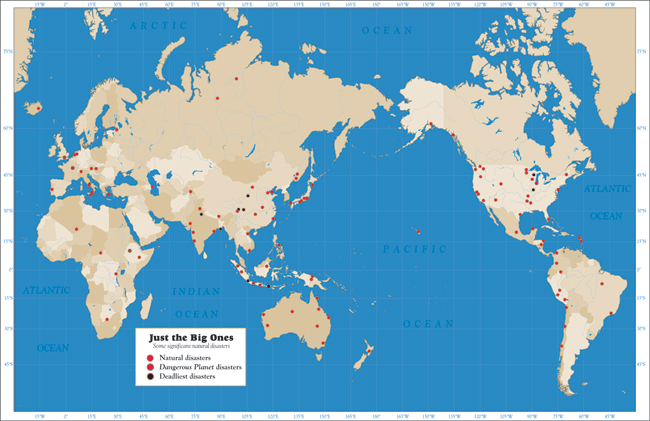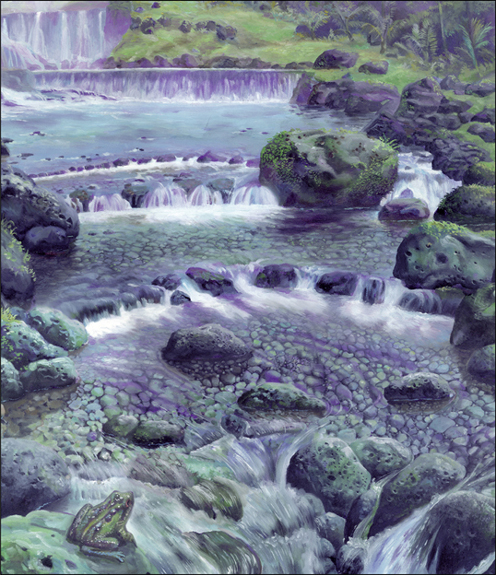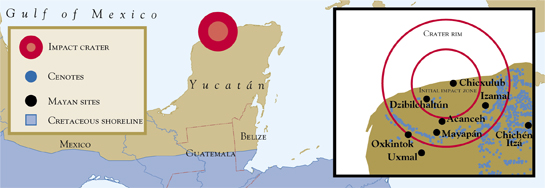Text and illustrations copyright 2003 by Bryn Barnard
All rights reserved. No part of this book may be reproduced or transmitted in any form or by any means, electronic or mechanical, including photocopying and recording, or by any information storage and retrieval system, without written permission from the copyright holders, except for brief passages quoted by a reviewer in a newspaper or magazine.
Published by Crown Publishers, an imprint of Random House Childrens Books, a division of Random House, Inc., New York.
CROWN and colophon are trademarks of Random House, Inc.
randomhouse.com/kids
Library of Congress Cataloging-in-Publication Data
Barnard, Bryn.
Dangerous planet : natural disasters that changed history / Bryn Barnard.
p. cm.
Summary: Describes specific occurrences of natural disasters, such as meteor impacts, landslides, typhoons, volcanic eruptions, and earthquakes, and their impact on human history.
Includes bibliographical references, glossary.
eISBN: 978-0-449-81493-2
1. Natural disastersJuvenile literature. [1. Natural disasters.] I. Title.
GB5019.B36 2003
363.34dc21 2002017545
v3.1
For William Pne du Bois, whose twenty-one balloons got me started
Contents
Pebbles in a stream
We live in a world governed by chance. Events tumble one after the other like pebbles washed down a stream. Some are small, such as the random puff of wind that spreads a dandelions seeds. Some are big, such as the Big Bang, which got our universe started. Most are in between, such as the movement of continents or the collapse of a civilization. Big and small, important and insignificant, event accumulates on top of event. Eventually, you get history. Occasionally, however, one event creates a cascade of consequences, an avalanche of pebbles. This one event changes everything that follows.
This book is about a select group of natural disasters that had far-reaching consequences with ripple effects across history. A natural disaster is a climatic or environmental occurrence that either kills or injures people, damages property, or causes financial loss. Most are unpredictable, spontaneous calamities called acts of God. Some, such as fire, may need human help to get started. All of these disasters were crucial shapers of the world we live in.
A drowned past
Imagine, for example, a world without ancient Greece. No Trojan Wars. No Greek civilization and thus no democracy. No Roman civilization, at least not one based on Greek models. No Roman Republic. No Roman law. No Roman arches, nor domes, nor columns (imagine churches or mosques without them!). No Romance languages. No English language.
That possible present disappeared with the near destruction of Minoan civilization by a volcano and a tsunami. The catastrophe gave the neighboring Mycenaeans their chance for greatness, creating the civilization that would be immortalized in Homers epic poems about Greece and Troy, The Iliad and The Odyssey.
Ive chosen nine amazing stories, selected for their impact, type, and setting. The events include a blizzard, a typhoon, a hailstorm, an earthquake, a fire, a volcanic eruption, a tsunami, a drought, and an extraterrestrial impact. The final pages are devoted to history-shaping disasters we might experience in the years to come.
Bigger than us
By focusing on a group of catastrophes selected for their profound effect on human history, Ive had to leave a lot out. Youll find no tornadoes here, for example. No landslides, no lightning strikes. Neither Australia (prone to devastating fire and drought) nor South America (cursed with landslides, hurricanes, earthquakes, and tsunamis) is represented. Neither of those continents disasters have had the kind of documented, long-term ripple effects discussed in these chapters. Moreover, none of the events discussed here are the worst, biggest, or deadliest of their class. If youre a world-record junkie, check out the world map in the front of the book. Ive listed a larger cross section of major natural disasters there for context.
It may seem simplistic to make disasters the stars of these historical dramas. What about human ingenuity, personality, culture, politics, technology, and the multitude of other influences that shape history? Surely those are important, too?
True enough. Many factors contributed to these natural disasters and their consequences. But being human, we often overemphasize our role in history: the celebrities, the speeches, the schemes, the romances, and the double-crosses. Were people, and naturally, we find ourselves fascinating. Not so many centuries ago, in fact, we imagined our world as the immobile center of a worshipful universe. The sun, the stars, and all the planets revolved around us: the most important beings in creation.
An unstable home
Today we know better. Our earth is a small planet with a molten center, a mobile crust, and a thin, unstable atmosphere, bombarded by radiation, hurtling through debris-filled space. Were located at the edge of a large but unexceptional galaxy. Scientists are still counting, but they estimate the universe contains at least 80 billion others.
That we exist at all is by the grace of countless evolutionary accidents. We can think, invent, span continents, dam rivers, and split the atom. We can orbit the globe, visit the moon, communicate across distances instantly, rearrange genes, and manipulate reality. But were still subject to the same whims of nature as any other species. When disaster strikesas it does repeatedly and with great effectits a reminder of our utter dependence on our dangerous planet for health, wealth, success, power, happiness, and survival.
Thats worth remembering.
Extinct again
Since the beginning of life on earth nearly four billion years ago, long periods of gradual evolution have been punctuated by episodes of global mass extinction. Each environmental wipeout has cleared the decks, allowing life to radiate in new directions. The creatures that were dominant before the extinction have been reduced or destroyed. After a pause, new organisms have filled the empty evolutionary niches and grown to dominate the environment. The first of these major extinctions was 440 million years ago. Four more followed at 365, 245, 210, and 65 million years ago. The last mass extinction annihilated the dinosaurs and gave mammals their chance. Mammals begat primates. Primates begat people. An extraterrestrial impact was the probable cause.


